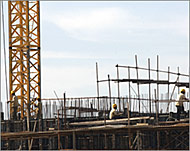Russia blocks UN nuclear ban on Iran
Russia, backed by China, has blocked an agreement on a UN Security Council statement aimed at quashing Iran’s nuclear ambitions, diplomats say.

Senior officials from Germany and the US, Britain, France, Russia and China – the five veto-holding Security Council members – met for more than four hours on Monday to discuss how to handle Iran.
They were joined by ambassadors to the UN but were unable to agree on a draft statement from the Security Council telling Iran to stop uranium-enrichment efforts.
Nicholas Burns, the UN under-secretary of state, said after the meeting at the British UN mission in New York: “We remain convinced that we will see a presidential statement. It just may take a couple more days.”
The statement has been under discussion for nearly two weeks already.
Disagreement
Russia and China are wary of action by the Security Council, which can impose sanctions, fearing that threats might escalate and prompt Iran to cut all contact with the International Atomic Energy Agency (IAEA) in Vienna.
Envoys, who spoke on condition of anonymity, said Russia was toughest on provisions in a draft statement and that China backed Moscow.
 |
|
The Bushehr nuclear power |
Emyr Jones Parry, Britain’s UN ambassador, said France and Britain, authors of the draft, would take another look at the text to see if it could be refined further.
The full 15-member council consults late on Tuesday.
Wang Guangya, China’s ambassador to the UN, was optimistic.
“There are a number of areas where we have common points and these will be narrowed in the days ahead,” he said. “We agreed to continue discussing it.”
Burns said the group had common aims. “All agreed that Iran is seeking nuclear weapons and is out of compliance with its international commitments,” he said.
|
“All agreed Iran is travelling down the road toward enrichment” Nicholas Burns, |
“All agreed Iran is travelling down the road toward enrichment. All agreed that we should stay united, stay together, to send one message.”
Envoys from the talks said there had been no firm proposals from Britain and others on the next step.
The West has considered a resolution under mandatory Chapter 7 provisions of the UN Charter if Iran does not comply but only after a statement is adopted.
Background
A statement needs the consent of all 15 council members while a resolution requires nine votes in favour and no veto from a permanent member. However, if there is no agreement on a statement, the Western powers could turn the draft into a resolution and dare Russia and China to veto.
In a deal struck in November 2004, Iran agreed with Britain, France and Germany – the negotiators for the European Union – to freeze any uranium conversion, enrichment and reprocessing in return for economic and political rewards.
That deal broke down last year and Iran restarted uranium conversion in August. The IAEA board agreed to report the issue to the Security Council, which received a dossier on 8 March.
On the statement, Russia and China have objected to a section of the draft setting a two-week deadline for the IAEA to report whether Tehran has stopped enrichment activities, saying it is too short.
The Western powers, at the suggestion of China, also revised a text on Friday, saying that Mohamed ElBaradei, director-general of the IAEA, would submit a progress report on Iran to the Security Council and the 35-member IAEA board at the same time. Earlier only the council was mentioned.